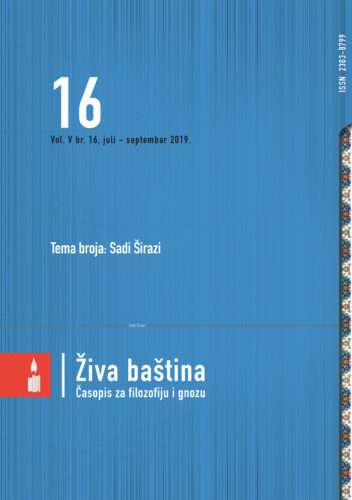UDK 32:929 Širazi
Politička misao u kolijevci iransko-islamske civilizacije imala je brojne ogranke. Ova misao je oblikovala političko mišljenje na iranskoj i osmanskoj teritoriji i možemo je smatrati najvažnijim doprinosom političkom mišljenju u periodu kad je islamska civilizacija živjela svoj vrhunac. Žanr sijasetname smatra se jednim od ogranaka političke misli. Hadže Nizam al-Mulk i Gazali svojim djelima Sijasetnama i Nesihat al-muluk svrstali su se u istaknute predstavnike žanra sijasetname koji se, zahvaljujući njima, preobratio u snažnu struju u političkoj misli iransko-islamske civilizacije, te su se nakon njih, a po uzoru na njih, mnogi mislioci okušali na ovom polju. I Sadi pripada plejadi autora koji su svoju političku misao iskazivali pisanjem sijasetname. Teme koje je u svojoj Sijasetnami tretirao Sadi su: božansko pravo vlasti i pozicija vladara, pravednost, sigurnost, blagost i uravnoteženost u vlasti, umjerenost i vezirstvo. U Bustanu i Đulistanu Sadi insistira na ulozi vladara i pravednosti, a u djelu Nesihat al-muluk uz ove dvije kategorije govori i o sigurnosti. Ovaj rad će predstaviti glavne specifičnosti Sadijeve političke misli.
Abstract
In the cradle of Iranian-Islamic civilization the political thought had numerous branches. This thought shaped the political opinion on the Iranian and Ottoman territory and can be considered the most important contribution to political opinion in a period when the Islamic civilization was at its peak. The genre of Siyāsatnāme is considered to be one of the branches of political thought. Nizam al-Mulk and Ghazali with their works Siyāsatnāme and Nasīhat al-mulūk placed themselves among the most prominent representatives of the genre of Siyāsatnāme which, thanks to them, turned into a powerful current in the political thought of Iranian-Islamic civilization, so that after them, many thinkers followed them as role models in this field. Sa‘dī also belongs to the group of authors who expressed their political opinion by writing Siyāsatnāme. The topics that Sa‘dī disscussed in his Siyāsatnāme are: the divine right of authority, the position of ruler, righteousness, security, gentleness, balance in rule, moderation and veziership. In Bustan and Gulistan Sa‘dī insists on the role of ruler and righteousness and in his work Nasīhat al-mulūk, in addition to these two categories, he talks about security as well. This paper will present the main characteristics of Sa‘dī’s political thought.
Keywords: Sa‘dī, Siyāsatnāme, Bustan, Gulistan

